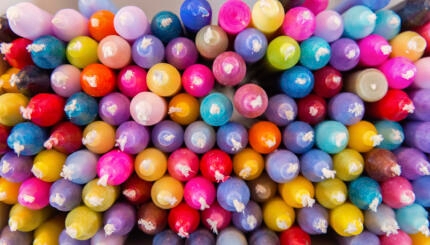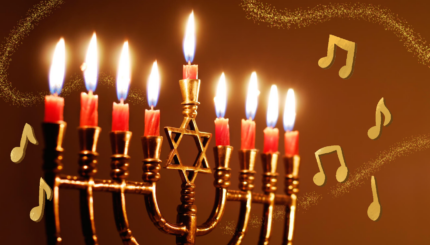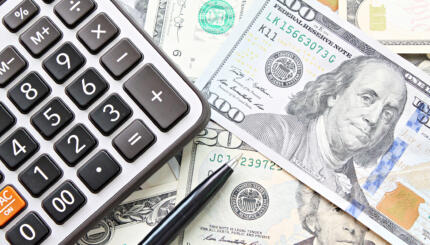In the Torah commentary of the Sefat Emet (“Language of Truth”), Rabbi Yehudah Leib Alter of Ger describes Hanukkah and Purim as holidays that the Jewish people “merited by their own deeds” rather than received through the commandments of the written Torah. They each represent a celebration of Jewish peoplehood; and as such, they are particularly open to interpretation and reinterpretation from both secular and religious viewpoints.
Early Zionists such as Theodor Herzl (1860-1904) adopted Hanukkah in particular as a celebration of Jewish national strength. In the succeeding years, Hanukkah has received unique Israeli interpretations as a national holiday, with symbols and themes given new meanings. These popular Israeli Hanukkah songs show some of the nation’s perspectives on the holiday.
Victory
The military victory and subsequent autonomous reign of the Hasmoneans provided an important example for the early Zionists, and these historical highlights continue to be important to the modern state. Jews regard the Hasmonean dynasty as a reference point of pride–the most recent period of autonomous Jewish rule in the Land of Israel until the founding of the State of Israel.
Early in the 20th century, the song “Who Can Retell?” (“Mi Yemalel?”) was written to celebrate the deeds of humans in bringing about both the victory of the Maccabees and the hoped for victory of people In modern times. This song references Psalms 106:2, which celebrates God’s mighty acts. The biblical verse was transformed into lyrics that extol the mighty acts of Israel. The Maccabees are described in the sons as bringing redemption and salvation, two acts usually associated with God.
With your help, My Jewish Learning can provide endless opportunities for learning, connection and discovery.
Such a bold celebration of a human-centered, military victory can challenge both Rabbinic and Diaspora sensibilities. The Talmudic Rabbis downplayed the role of military might and lifted up the role of God in their celebration of Hanukkah. In the contemporary Diaspora, celebrations of might are sometimes similarly viewed as lacking in proper humility or spirituality.
Many people do not want to appear jingoistic or to look as though they were celebrating a version of “might is right”; and they are uncomfortable with taking pride in military strength or victories. Yet many Jews, remembering centuries of oppression, take pride in the prowess of the State of Israel. The ability of Jews to defend, protect, and rule themselves is one of the country’s values; and the Hanukkah celebrations in Israel highlight this theme.
Who Can Retell?
Words: Ravina
Music: Folk tune
Who can retell the mighty deeds of Israel, who can count them?
In every generation a hero will arise, a redeemer for the people.
Listen!
In those days in this time
The Maccabee saves and redeems
And in our day the whole people of Israel
Will join together and arise and be redeemed.
Light
Light is a major theme of Hanukkah, as one of the descriptive names of the holiday, Hag Ha-Urim (“Festival of Lights”), makes clear. In most of Israel, in regard to Hanukkah, the halakhah is strictly followed. It says that Hanukkah lights must be kindled very close to nightfall and the hanukkioh must be placed where the light can be seen.
In the book A Different Light: The Big Book of Hanukkah, Noam Zion describes how the Rabbis of the talmudic era made the lighting of Hanukkah candles a family event rather than a national event. In modern day Israel, that situation has in some ways been reversed. A torchlight parade from Modi’in, where the Maccabees lived, to Jerusalem marks the beginning of Hanukkah celebrations; and large hanukkiot appear on public buildings to emphasize the national character of the holiday.
The well-known song “We Have Come to Cast Out Darkness” (“banu Hoshech Legaresh“) equates light with the individual and the community. Each of us, says the song, is a small light;and together we are one powerful light.This song may hearken back to the prophecy of Isaiah 49:6 that Israel will be “a light of nations.” It also emphasizes the power and importance of community for the State of Israel. Only by banding together were the Maccabees able to succeed; only by having citizens who support one another will the modern country survive.
We Have Come to Cast Out Darkness
Words: Sarah Levy-Tanai
Melody: Emanuel Amiran
We have come to cast out darkness
In our hands are light and fire
Each one is a small light
Turn back darkness
Turn back dark
Turn back from before the light.
Oil
The famous miracle of Hanukkah happened through a cruse of oil, and olive oil is important to the celebration of Hanukkah in Israel. Many people perform the mitzvah of lighting the hanukkiah by doing so with oil. The staple food of the holiday is a never ending supply of doughnuts called sufganiyot, deep-fried in oil. In the song “The Days of Hanukkah,” children often parody the line that mentions how we will eat lots of doughnuts; they sing, ”We will throw them in the street.” This rephrasing recognizes the tendency of sufganiyot to become like hockey pucks when left out for a day or two!
The cruse of oil itself is personified in the song “A Small Cruse” (“Kad Katan“). For eight days, according to the song, this small jug gave its oil to light the Temple. In the lyrics, the jug becomes the center of the miracle–its small size representing the ability of the few to conquer the many.
A Small Cruse
Words: Aharon Ashman
Melody: Yoel Valba
A small cruse, a small cruse
Eight Days gave its oil
All the people wondered
From where it was being refilled
All the people gathered
And proclaimed it a miracle
If this cruse had not remained
Our Temple would not have been lit.
Several Hebrew Hanukkah songs, besides “A Small Cruse” also mention the rededicated Temple in Jerusalem and also refer to it as “Our Temple” (Mikdoshenu). Later this Temple was destroyed (70 CE); and despite the centuries that have elapsed since then, the songs have no difficulty proclaiming our present-day connection with the place. These lyrics contrast to those of numerous Hanukkah songs written in English that do not even mention the site.
Perhaps Israelis who are singing about the Temple are not connecting with the Temple as a center of worship but rather as a national symbol. The Temple in Jerusalem, in its time, represented the unity of the Jewish people and their geographic center. For modern Israel, Hanukkah reaffirms the connection of the Jewish people to their ancient holy site and their ancient home.
The various secular interpretations of traditional Hanukkah symbols strengthen communal ties, nourish hopes for victory and success, and remind us of the eternal connection of our people and our history to the sacred land. In Israel, Hanukkah celebrates real political aspirations and achievements, alongside spiritual goals and ideals.
Reprinted with permission from Celebrating the Jewish Year: The Winter Holidays, published by Jewish Publication Society.
Explore Hanukkah’s history, global traditions, food and more with My Jewish Learning’s “All About Hanukkah” email series. Sign up to take a journey through Hanukkah and go deeper into the Festival of Lights.
Aharon
Pronounced: ah-ha-RONE, Origin: Hebrew, Aaron in the Torah, brother of Moses.
Hanukkah
Pronounced: KHAH-nuh-kah, also ha-new-KAH, an eight-day festival commemorating the Maccabees' victory over the Greeks and subsequent rededication of the temple. Falls in the Hebrew month of Kislev, which usually corresponds with December.
mitzvah
Pronounced: MITZ-vuh or meetz-VAH, Origin: Hebrew, commandment, also used to mean good deed.
Purim
Pronounced: PUR-im, the Feast of Lots, Origin: Hebrew, a joyous holiday that recounts the saving of the Jews from a threatened massacre during the Persian period.
Torah
Pronunced: TORE-uh, Origin: Hebrew, the Five Books of Moses.



